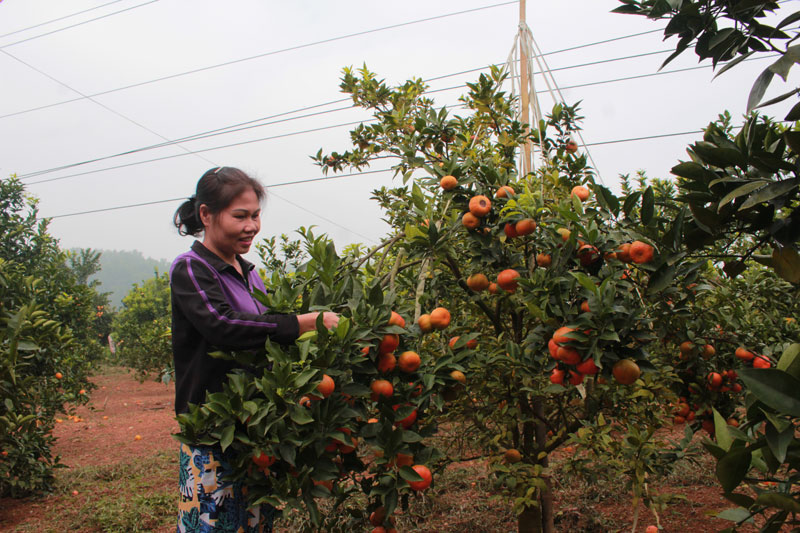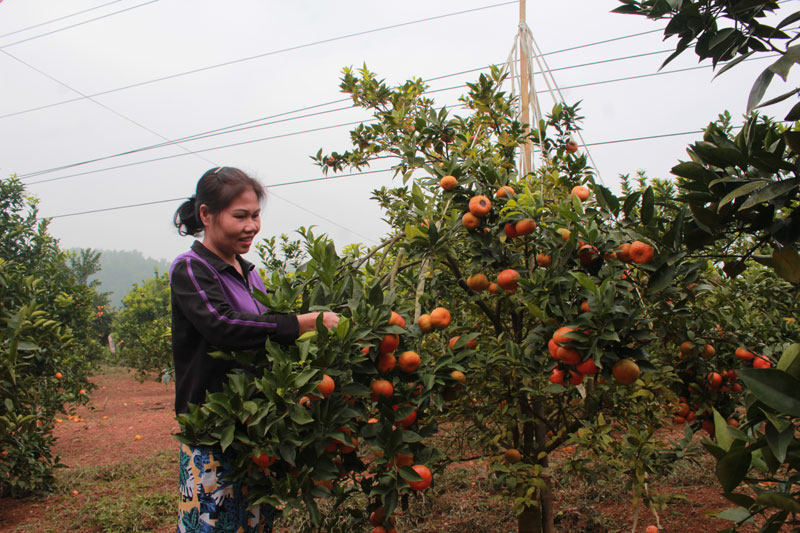
(HBO) – Over the past years, the Vietnam Bank for Social Policies (VBSP)’s branch in Luong Son district, the northern mountainous province of Hoa Binh, has successfully implemented the Government’s preferential loan programmes. Through entrusted organisations and associations, the loans have come to the right persons, helping them overcome difficulties and escape from poverty sustainably.
Duong
Quoc Lap, in Lam Truong village, Truong Son commune, Luong Son district, invests
in fruit tree planting.
Duong Quoc Lap, in Lam Truong village, Truong Son commune, Luong Son district,
got a loan of 30 million VND from the VBSP to plant nearly 2 hectares of
oranges and pomelos. His orchard is expected to generate about hundreds of
millions of Vietnam dong each year.
With simple and rapid procedures, long terms and low interest rates, the
preferential loans are necessary for poor households and social policy
beneficiaries in Luong Son district. Hundreds of local households have accessed
the loans and used them effectively.
Currently, the VBSP’s branch in Luong Son district is implementing 15 credit
programmes for social policy beneficiaries. Most of them have been entrusted
partially through political-social organisations, with entrusted loan balance
accounting for 99.2 percent of the total loan outstanding balance.
The district has 245 saving and lending groups in 20 communes and townships. At
the end of 2018, loans worth 68.5 billion VND were given to local households,
with accumulated loan outstanding balance exceeding 254.5 billion VND by 9,564
households. Debt collection was over 50.4 billion VND and overdue debts make up
only 0.1 percent of the total loan outstanding balance.
The bank and its entrusted organisations have instructed their staff to follow
procedures, and coordinated with relevant agencies to create favourable
conditions for members of the saving groups to participate in training courses
on husbandry, cultivation and capital management./.
The emulation movement "Hoa Binh joining hands to build new-style rural areas” has been widely spreading, becoming a driving force that motivates the localities to renew rural landscapes and improve the material and spiritual lives of the residents. In this movement, the people play a central role-both as the main implementers and direct beneficiaries of its outcomes.
In response to the global digital revolution, Hoa Binh Newspaper is transforming itself into a modern and multi-platform media hub, blending cutting-edge technology with a restructured newsroom and a new generation of tech-savvy journalists.
Hoa Binh province’s Association of the Elderly recently held a conference to review the project on expanding the inter-generation self-help club model until 2025.
In a move to implement Resolution No. 57-NQ/TW, issued on December 22, 2024 by the Politburo, which targets breakthroughs in science-technology development, innovation, and digital transformation, the Hoa Binh provincial Department of Health has issued a plan to roll out the "Digital Literacy for All” campaign within the local health sector.
An Nghia Commune (Lạc Sơn District) is one of the communes that achieved the tha standard of the national new rural area in 2018. Entering a new development phase, the commune is now trying to meet the criteria for the advanced new rural development. With the strong political will and the public consensus, the commune is gradually overcoming the challenges to reach this goal, aiming for the sustainable development.



